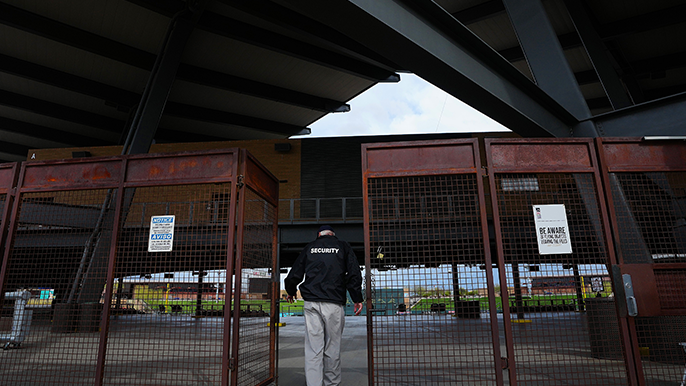
Major League Baseball owners and MLB Players Association representatives met for about 17 hours from Tuesday into early Wednesday in New York in an effort to strike a collective bargaining agreement.
The meetings came with the overtone of a deadline to save a 162-game season set by MLB. The league had previously canceled the first two weeks of the season after the sides failed to strike a deal last week, but apparently reneged with this new arbitrary deadline.
Monday’s bargaining ultimately didn’t result in a deal, but the two sides plan to reconvene later Wednesday according to The Athletic’s Evan Drellich. The new deadline to save games is reportedly extended, and talks are considered ongoing.
Before the deadline extension, MLB made an offer to the MLBPA. According to Drellich, the proposal included the league’s biggest shift on the competitive balance tax yet, going from a starting threshold of $220 million to $230 million. That would increase over the duration of the five-year deal up to $242 million.
The MLBPA most recently offered a CBT with a starting threshold of $238 million; MLB’s offer appears to be in somewhat of the middle of the two. But there were additional conditions attached to the league’s offer — according to Drellich, the league wants a third level of surcharge for teams that dip into the tax.
The luxury tax has been the most contentious issue for much of the negotiations as players believe it has acted as a de facto salary cap instead of its intended purpose of curbing runaway spending. An additional level of surcharge, in theory, would be true to the latter goal of the rule.
In addition to the increased tier of CBT penalties, MLB’s offer tied the pre-arbitration bonus pool spending to the tax. This would mean if a rostered player becomes eligible for the pre-arbitration pool money in the new CBA based on his performance, that money spent by the club would count toward the team’s tax bill.
That pre-arbitration pool — a new feature for the league — still is contested. MLB offered a $40 million pool flat over time, per Drellich, while the MLBPA most recently offered $80 million. The concept is designed to help players get paid earlier in their careers.
The league also made changes to their offers on minimum salary, the draft lottery, service time and the amount of times a player can be optioned in a season. The league also wants the ability to expedite all rule changes, not just the ones mutually agreed upon (bigger bases, pitch clock, infield shift ban).
Another key issue to watch is MLB’s proposal to institute an international draft. The league argues that the current system of international signing is too broken to be reformed, but many Latin American players are expected to oppose it, as the system would have its own concerns.
When Day 97 of the lockout turned into Day 98, it was the union’s turn to counter. Instead of shutting MLB’s proposal down — in Jupiter, Fla., the players unanimously rejected the league’s self-proclaimed best offer — the MLBPA requested to reconvene in a few hours.
There was no deal, but also no more games canceled. Talks are set to resume again Wednesday after the sides get some rest.


